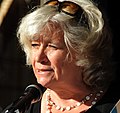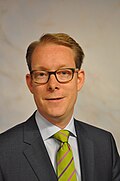| Name | Period | Party | Title |
|---|
| | Anna-Greta Leijon (1939–2024) | 1 January 1974 – 8 October 1976 | Social Democratic Party | Minister of immigration and minister for gender equality |
| | Eva Winther (1921–2014) | 18 October 1978 – 12 October 1979 | Liberal People's Party | Minister of immigration and minister for gender equality |
| | Karin Andersson (1918–2012) | 12 October 1979 – 8 October 1982 | Centre Party | Minister of immigration and minister for gender equality |
| | Anita Gradin (1933–2022) | 8 October 1982 – 9 October 1986 | Social Democratic Party | Minister of immigration and minister for gender equality |
| | Georg Andersson (born 1936) | 9 October 1986 – 29 January 1989 | Social Democratic Party | Minister of immigration |
| | Maj-Lis Lööw (born 1936) | 29 January 1989 – 7 October 1991 | Social Democratic Party | Minister of immigration and minister for gender equality |
| | Leif Blomberg (1941–1998) | 7 October 1994 – 22 March 1996 | Social Democratic Party | Minister of immigration |
| | Ulrica Messing (born 1968) | 22 March 1996 – 6 October 1998 | Social Democratic Party | Minister for labour law and minister for gender equality |
| | Erik Ullenhag (born 1972) | 5 October 2010 – 3 October 2014 | Liberal People's Party | Minister for integration |
| | Åsa Lindhagen (born 1980) | 21 January 2019 – 5 February 2021 | Green Party | minister for gender equality |
| | Märta Stenevi (born 1976) | 5 February – 30 November 2021 | Green Party | Minister for gender equality and minister for housing |
| | Eva Nordmark (born 1971) | 10 September 2019 – 18 October 2022 | Social Democratic Party | Minister for employment and minister for gender equality |
| | Johan Danielsson (born 1982) | 30 November 2021 – 18 October 2022 | Social Democratic Party | Minister for housing and deputy minister for employment |
| | Paulina Brandberg (born 1983) | 18 October 2022 – 1 April 2025 | Liberals | Minister for gender equality and deputy minister for employment |
| | Nina Larsson (born 1976) | 1 April 2025 – | Liberals | Minister for gender equality |
|





















